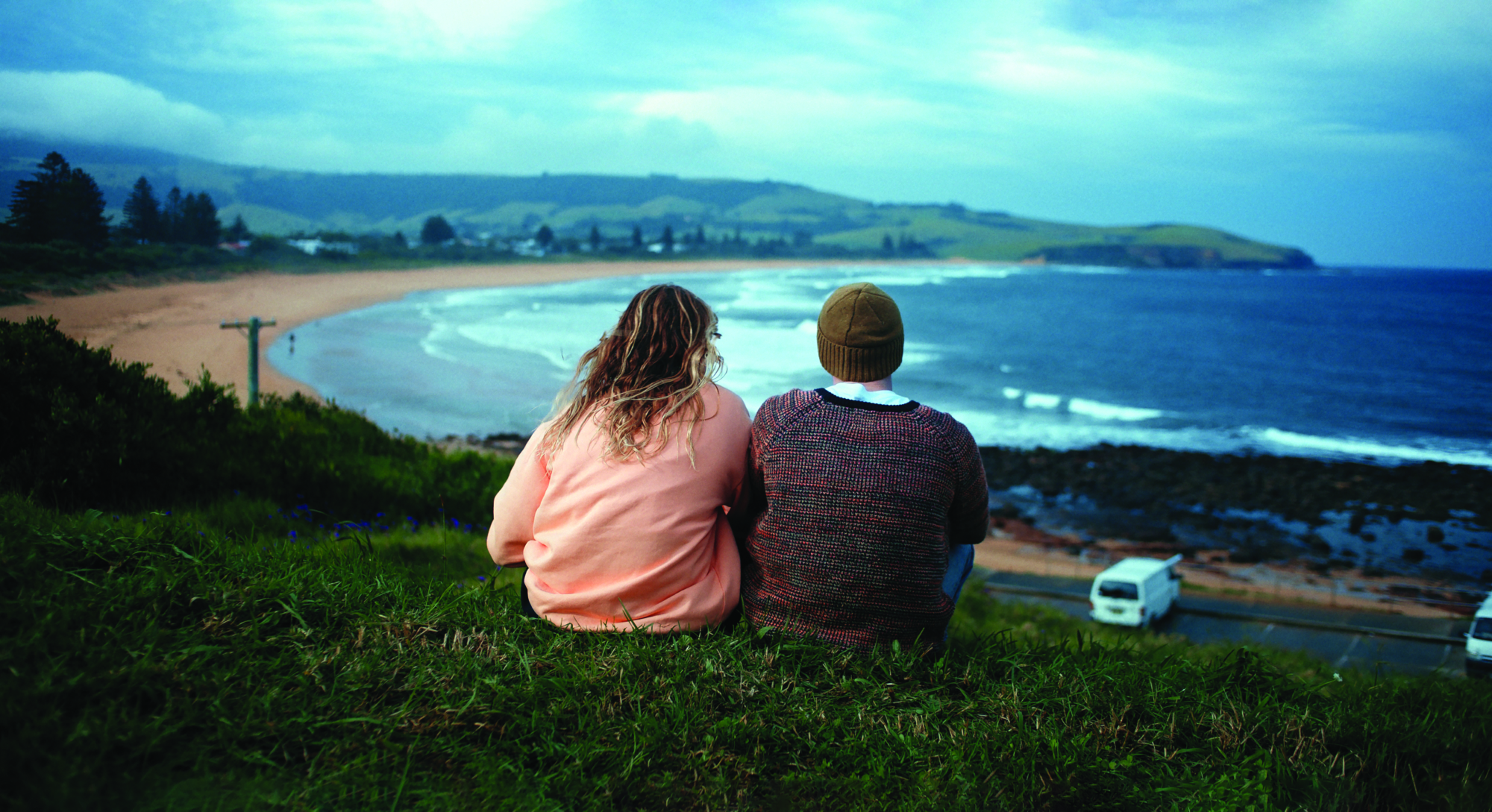My happiness is slowly creeping back / now you’re at home.
– Powderfinger, ‘My Happiness’
Sharing drinks out of a silver goon bag with sun-kissed cheeks and smiling faces, three teenage best friends – Summer (Yasmin Honeychurch), Maxie (Rasmus King) and James (Rory Potter) – are sitting in an old dinghy in the middle of a secluded river. Softly, Summer begins to sing Brisbane rock band Powderfinger’s 2000 hit ‘My Happiness’, accompanied only by the quiet natural symphony of birdsong, the wind rustling in the gum leaves and the lapping of water along the side of the small boat. Maxie and James smile at her and join in; as the song builds, Maxie stands up in the middle of the boat and stretches his arms out, overcome, as the three of them belt out the chorus. It’s a moment of complete peace that encapsulates the euphoric freedom of youth.
Directed by Australian filmmaker and musician Macario De Souza, 6 Festivals (2022) is a coming-of-age film about three friends and the strength they find in music when they hit their lowest points. Rocked by news that James has been diagnosed with cancer, Summer, Maxie and James make a pact to attend a bucket list of music festivals by the end of the year. The film is told in episodic form, with each chapter framed around and filmed at a different festival on Australia’s east coast. Featuring cameos and live performances from some of the country’s biggest acts, 6 Festivals uses music to reinforce meaning in the narrative by demonstrating connections between the artists’ songs and the film’s characters.
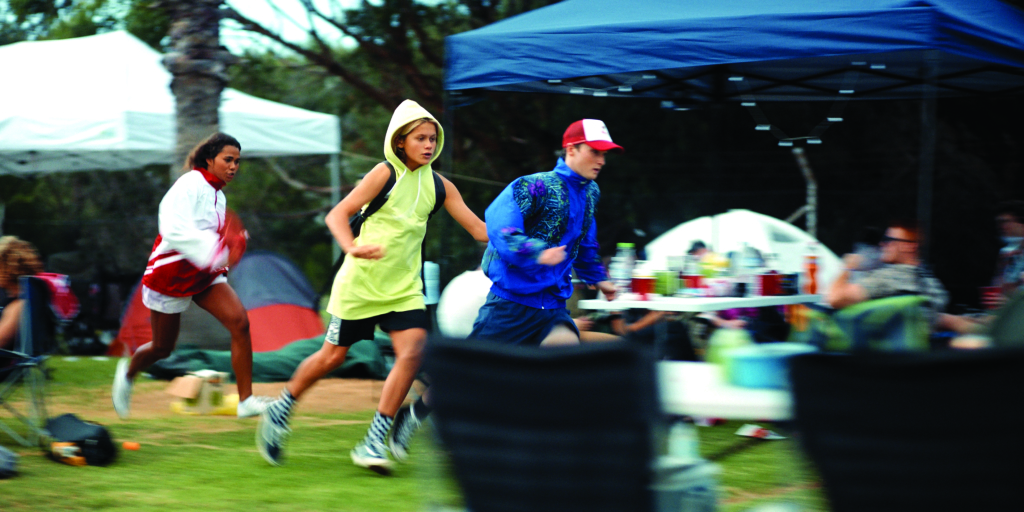
For De Souza, music festivals are a rite of passage, especially for young Australians. ‘[It’s a place where] our parents would actually allow us to go as young adults and be responsible with our friends,’ he tells me.
We had this amazing freedom and this big open space and music to dance to […] I remember having my first kiss [at a festival … as well as] discovering some of my favourite bands and falling in love with live music.
He sees festivals as a sacred – almost religious – gathering in terms of their ability to bring people together:
You put everything else on hold, just to go and have this day of fun with your friends and music […] You look around and there’s smiles on everyone’s faces. There’s the hugging, the dancing, the singing …
In 6 Festivals, drone shots are used to capture the scope of the festivals. Back on the ground, the camera weaves in and out of crowds as they dance and sing along to the acts on stage. By being able to film among these live events, De Souza was able to capture the intimacy he describes and represent how influential music and festivals can be on young lives.
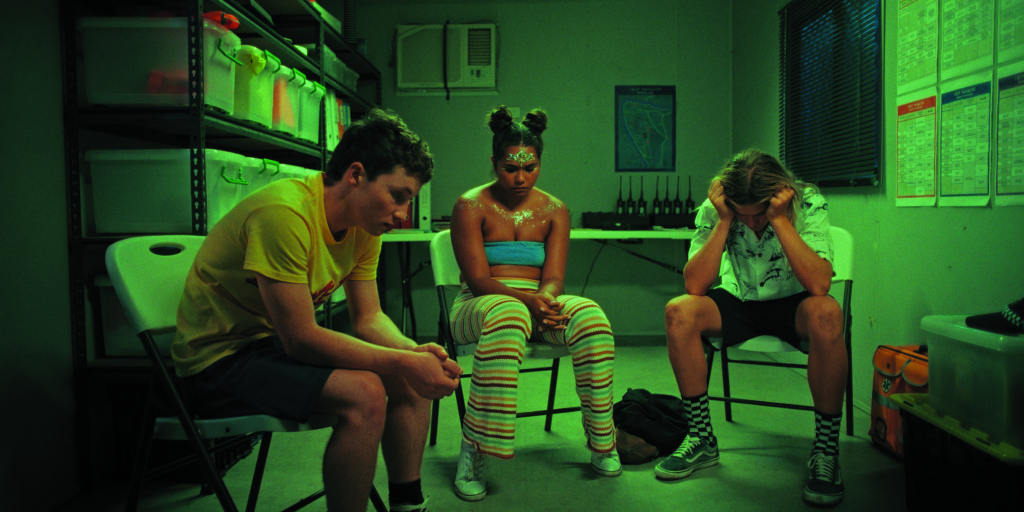
The second festival of the film, Big Pineapple, is later described by James as both ‘the best and worst day of [his] life’. Featuring epic highs such as meeting some of his music idols including Bliss n Eso, G Flip and Dune Rats, which he later plays on stage with, the festival is also an early breaking point for him. Already heartbroken at seeing his business cards left behind by artists he admires – a sign they do not take him or his aspiration to start his own festival seriously – he becomes even more distressed when his mother receives a phone call from his doctor. Before he can hear what the call is about and assuming that it could only be bad news, James runs away, stealing a bottle of vodka along the way. Breaking into the giant fibreglass fruit that gives the festival its name, James makes his way to the top viewing platform just as G Flip’s set is beginning. As he stands at the top of the structure, the sun now setting around him, the scene is intercut with G Flip’s performance of their song ‘I Am Not Afraid’.
‘When I wrote the script, I was very particular about the artists that [were] selected […] and would pick songs that would drive the narrative […] and complement the emotion of the scene,’ De Souza recounts. With James standing alone, drunk, his eyes rimmed red from unshed tears, the lyrics of the song become a form of narration for the scene. ‘So take me as I am / watch me as I go’ G Flip sings as a close-up focuses on James, bottle clutched in one hand, climbing up onto the safety railing. The song continues – ‘and I tried / and I cried’ – as James pulls himself up and stands at this new, precarious height. A tear glistens on his face, reflected by the atmospheric lighting, before the film cuts to the festival stage and a wide shot showing the audience waving their arms and singing along as G Flip belts out the chorus: ‘I am not afraid to do this alone / I know that it scares you but I am my own home’. Juxtaposed with the vision of James, this footage succinctly demonstrates the raw energy, emotion and powerful connection of music festivals that De Souza was ‘obsessed’ with capturing.
Featuring cameos and live performances from some of the country’s biggest acts, 6 Festivals uses music to reinforce meaning in the narrative by demonstrating connections between the artists’ songs and the film’s characters
Discussing the scene, De Souza tells me that ‘I Am Not Afraid’ was a ‘hero’ song for the film. As James struggles to come to terms with his diagnosis, it is evident in this moment that he is, in fact, afraid. He has ignored calls from his loved ones and escaped into a bottle of liquor to put himself in a dangerous situation – the implication being that, maybe, if he falls, it’ll all be over. But by including the song in the scene and matching the lyrics to James’ actions, the emotional beats of the song also act as catharsis. Almost as if to try and convince himself that he, too, is not afraid, James later screams out into the darkness as G Flip sings ‘and I cried’, the ‘I’ in this line sung on a four-beat held note. Although the lyrics speak of individual resilience, the cuts between the collective experience of the live performance and James’ solitary escape suggest that music itself is a way to not be alone. G Flip understands; G Flip has been there, too. Once the performance comes to a close, James remains standing on the ledge, breathing heavily as if the song has gone through him. It is only when the sound of his favourite band, Dune Rats, is heard in the distance that James gets down and returns to the festival. Music has saved him, yet again.
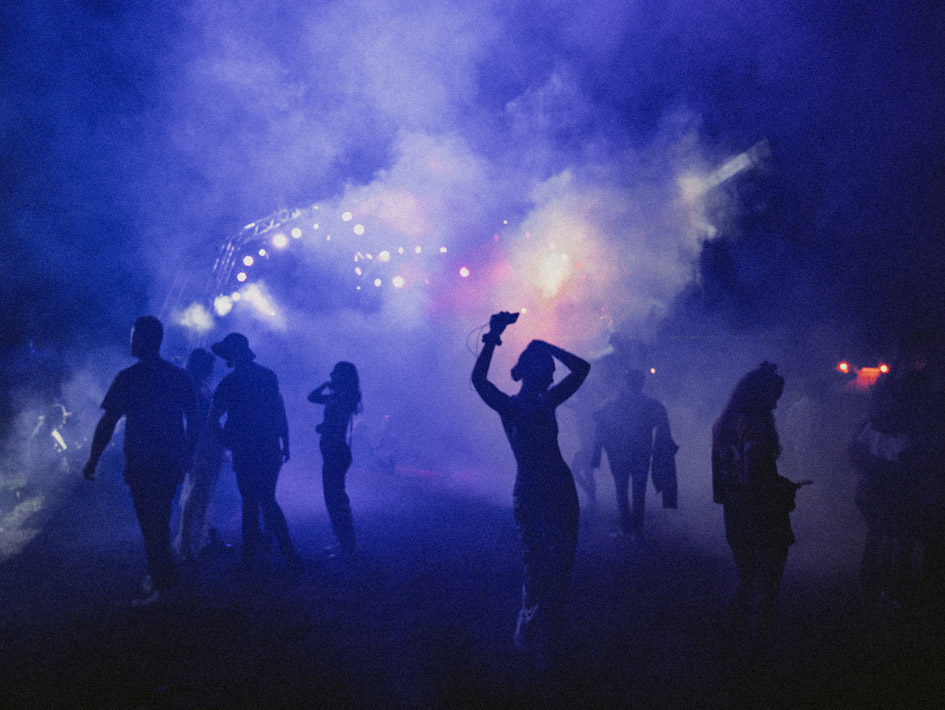
Growing up, De Souza was a big fan of coming-of-age films such as Stand by Me (Rob Reiner, 1986), La Haine (Mathieu Kassovitz, 1995)and City of God (Fernando Meirelles, 2002).What connects the three films, and so many others like them, is how their young protagonists are thrust into situations that force them to grow up too quickly. In 6 Festivals, not only are the three protagonists confronted with James’ diagnosis, but Summer and Maxie also both come from unstable homes, having been left largely to raise themselves. For Maxie, in particular, the loss of his mother and absence of his father – who is currently in prison – result in him being left in the care of his deadbeat, drug-dealing brother, Kane (Kyuss King), whom he hates. Maxie is reliant on his elder brother to get tickets for himself and his friends to CityFest,[1]Unlike most of the other music festivals shown in the film, CityFest is a fictional event created for the film to circumvent implicating any actual festival in a drug-related plotline. and Kane’s assistance comes with conditions: Maxie must smuggle drugs into the festival for him. This leads to a tense sequence that homes in on the narrative’s theme of loss of innocence.
CityFest is where, in De Souza’s words, ‘shit hits the fan’. Hiding out in a dirty portaloo with the drugs after his brother ditches him, Maxie becomes frustrated at being left in this situation and takes some GHB. The scene turns chaotic; he starts to freak out and has a bad trip. Excerpts from a live performance of ‘Riding Through the Fire’ by rap trio East AV3 are intercut with Maxie rolling around on the toilet floor as red and blue lights flash erratically. This combination of lighting and the song’s frantic pace creates an unstable and fearful atmosphere, which only abates when Summer and James come to the rescue.
As Maxie’s friends attempt to sober him up, Summer takes charge, asking him what he took and providing him with water, complaining that he sounds ‘like [her] fucking mum when she’s all fucked up’. James, in distress at the state his friend is in, asks incredulously why he would take drugs. ‘Maybe he’s having a hard time dealing with his best mate being sick,’ Summer retorts. As Maxie continues to be unresponsive, Summer and James are left with no option but to call Kane.
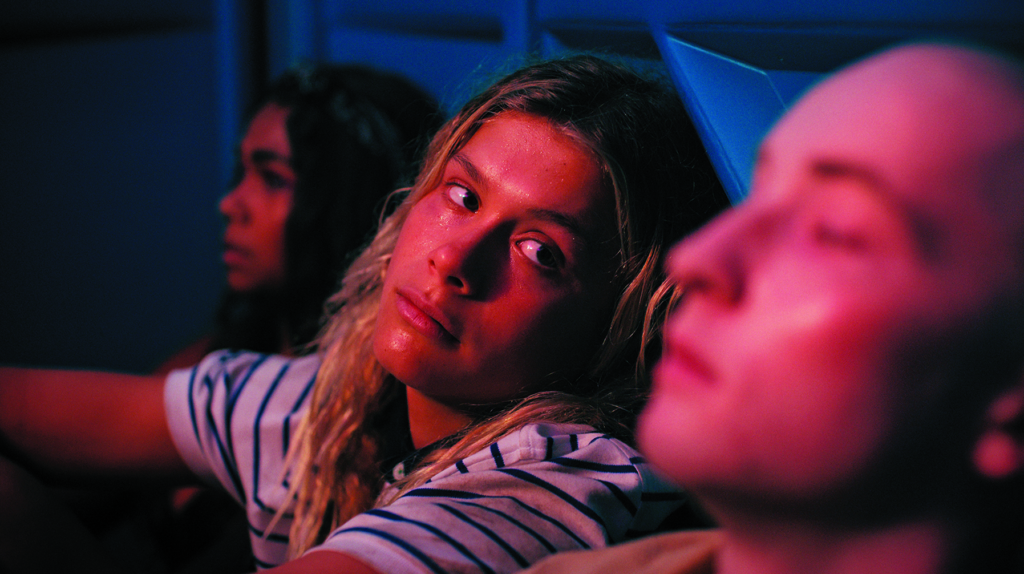
It is at this point that another performance at CityFest begins. Like ‘I Am Not Afraid’, this track, Ruby Fields’ ‘Dinosaurs’, was always in the director’s plan. ‘I was always trying to find a place for [the song]. The point of the lyrics is that loss of innocence […] and it fell into place for me [with this] scene,’ De Souza explains. ‘It’s actually one of my favourite parts of the film […] It’s a pretty heavy scene, but it’s reality.’ In the song’s chorus – ‘I used to love dinosaurs when I was a kid / I wasn’t afraid; I was brave and courageous with everything I did’ – Fields speaks to a longing for a simpler time, and how growing up brings new fears. During her performance, the camera is situated on stage with her as she stands and sings alone, creating an intimate atmosphere. It begins as a soft, acoustic rendition, shrouded in darkness and soft lighting, a contrast to the energy of East AV3 earlier in the sequence. As she sings the chorus, the film cuts back to the portaloo: a distressed James talks to Kane on the phone, and Summer cradles Maxie as he lies on the ground, fear in her eyes. The experience of these new anxieties – James’ illness and Maxie nearly overdosing – forces the friends to confront the tensions between them and why, try as they might, they can no longer be the carefree kids the audience saw at the start of the film.
As Maxie eventually comes to, the song comes to an end with a shot of Fields on stage, her fellow musicians huddled around her. Although the song’s final lyric is ironic in context – ‘So I’ll just watch Jurassic Park for the fiftieth time / avoiding plans I’ve made with my own friends’ – the silent laughter on each bandmate’s face effortlessly communicates friendship and mutual support.
Fields’ performance … has served its narrative purpose: coming of age may be full of fear and dangerous situations that young people can hardly comprehend, the song imparts, but it isn’t something that has to be dealt with alone
‘Dinosaurs’ demonstrates a shift in the three best friends’ lives and relationships with one another. With Maxie now sober, the trio sit with their backs to the wall of the portaloo and are finally able to reconnect. Although James is frustrated at having missed Fields’ performance, it has served its narrative purpose: coming of age may be full of fear and dangerous situations that young people can hardly comprehend, the song imparts, but it isn’t something that has to be dealt with alone. At times of transition, music can help to process the complicated feelings and situations young people endure[2]See Claire White, ‘No Soundtrack Captures the Feeling of Being Young and Sad Like The Perks of Being a Wallflower’, Junkee, 29 April 2020, <https://junkee.com/the-perks-of-being-a-wallflower-soundtrack/251853>, accessed 23 May 2022 – and it’s also a common ground on which connection and community can be formed. This is something that De Souza – who grew up attending music festivals – clearly understands deeply, and, in 6 Festivals, he captures it vividly.
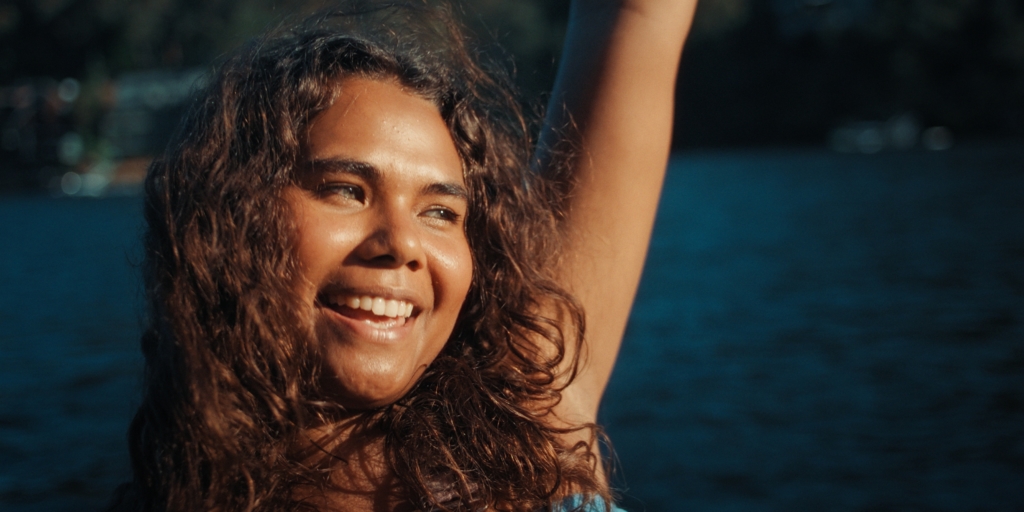
James does end up achieving his dream of organising and putting on his own festival, Splendour in the Bra (short for the Sydney suburb of Maroubra), even though he is not around to see it. In a pre-recorded video Summer and Maxie watch together after his passing, James counts down the festivals they attended together, and conveys his hopes for his two friends: ‘May your lives remain a music-playing, festival-slaying, dream-chasing adventure.’ The film’s sixth and final festival is an intimate affair held in the backyard of James’ family home, but features acts he admired and met along the way, including Dune Rats and Fields; it culminates with James’ friends and family singing along to the song that started it all, ‘My Happiness’ by Powderfinger, smiling and in one another’s arms. Although James is gone, his spirit and memory remains alive in the music and the festivals he loved.
Endnotes
| 1 | Unlike most of the other music festivals shown in the film, CityFest is a fictional event created for the film to circumvent implicating any actual festival in a drug-related plotline. |
|---|---|
| 2 | See Claire White, ‘No Soundtrack Captures the Feeling of Being Young and Sad Like The Perks of Being a Wallflower’, Junkee, 29 April 2020, <https://junkee.com/the-perks-of-being-a-wallflower-soundtrack/251853>, accessed 23 May 2022 |
